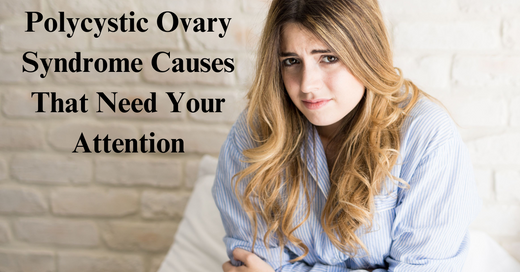
Polycystic Ovary Syndrome Causes That Need Your Attention
Share
The journey with polycystic ovary syndrome (PCOS) can feel overwhelming, both physically and emotionally. It may cause a range of symptoms such as irregular periods, weight gain, acne, excessive hair growth, and fertility struggles, leaving many women feeling frustrated and helpless. The hormonal imbalances that drive PCOS can also affect mood, leading to anxiety or depression. It's important to remember that there are treatments and lifestyle changes that can help manage the symptoms. Considering how many women are impacted by this problem, let us try to understand it better.
Table of Contents
- Polycystic Ovary Syndrome: Symptoms, Causes, and Treatment
- Genetics:
- Hormonal Imbalances:
- Insulin Resistance:
- Inflammation:
- Environmental Factors:
- Ovary Structure:
- Other Hormonal Factors:
- Developmental Factors:
- Diagnostic and Management Approaches:
- Nautural Way of Treatment
- Ayurvedic Treatment
- Surgical Treatment
- Conclusion:
- Frequently Asked Questions:
Polycystic Ovary Syndrome: Symptoms, Causes, and Treatment

Polycystic Ovary Syndrome (PCOS) is a complex and common endocrine disorder that affects women often during their reproductive years. Polycystic ovarian syndrome (PCOS) symptoms can vary in severity. Common symptoms include irregular or absent periods, difficulty conceiving due to irregular ovulation, unwanted hair growth in various areas, weight gain, hair thinning on the scalp, acne or oily skin, and dark, thick skin patches under the breasts, in the armpits, and on the back of the neck. The exact cause of PCOS is not known yet, but several factors are thought to contribute to its development. Let’s look at some common factors:
Genetics:
- Family History: There may be a genetic predisposition to PCOS as the condition tends to run in families. Certain genes might increase susceptibility, though no single gene has been identified as the cause.
- Inherited traits: Potentially contributing factors include variations in genes linked to insulin sensitivity and hormone regulation.
Hormonal Imbalances:
- Androgens: PCOS is characterised by elevated levels of androgens, or male hormones like testosterone. These excess androgens can lead to symptoms like hirsutism (excessive hair growth) and acne.
- Luteinizing hormone (LH) and follicle-stimulating hormone (FSH): An unbalanced amount of these hormones can obstruct ovulation and interfere with regular ovarian function.
Insulin Resistance:
- Insulin Levels: Insulin resistance is a condition in which a large number of PCOS patients have ineffective insulin cellular responses, which results in higher insulin levels in the blood.
- Hyperinsulinemia: Symptoms of PCOS may worsen due to elevated insulin levels that may lead to an increase in androgen production by the ovaries.
Inflammation:
Chronic low-grade inflammation: Research indicates that a higher prevalence of chronic low-grade inflammation is present in PCOS patients, which may be linked to hormonal imbalances and insulin resistance.
Environmental Factors:
- Lifestyle factors: Physical activity, diet, and obesity can all have an impact on how severe PCOS symptoms are.
- Endocrine disruptor exposure: Although there is currently little proof, some researchers hypothesise that exposure to specific environmental chemicals may be a factor.
Ovary Structure:
Ovarian Cysts: PCOS is characterised by multiple small cysts in the ovaries, though the presence of these cysts alone is not sufficient for diagnosis. They are thought to result from a failure to ovulate properly.
Other Hormonal Factors:
Imbalance in Oestrogen and Progesterone: When ovulation is irregular, there is an imbalance in the levels of these two hormones, which can impact menstrual cycles and hasten the formation of cysts.
Developmental Factors:
Foetal Development: According to certain theories, hormonal imbalances during foetal development may play a role in the development of PCOS in later life.
Diagnostic and Management Approaches:
Diagnosis typically involves assessing symptoms, blood tests for hormone levels, and imaging studies like ultrasound to visualise ovarian cysts. Managing PCOS often includes lifestyle modifications (diet and exercise), medications to regulate hormones and insulin, and treatments for specific symptoms like acne or hirsutism. There are numerous options for treatment:
Nautural Way of Treatment
Polycystic Ovary Syndrome (PCOS) can be managed through lifestyle changes, dietary adjustments, and natural remedies. Key strategies that can effectively alleviate PCOS symptoms:
- Dietary Modifications: Adopt a low Glycaemic Index diet rich in whole grains, legumes, vegetables, fruits, and anti-inflammatory foods like leafy greens, berries, nuts, seeds, and fatty fish, along with lean proteins and healthy fats.
- Physical Activity: Engage in regular exercise, such as walking, cycling, and strength training, to aid weight management and enhance insulin sensitivity.
- Weight Management: Achieving even a small weight loss can significantly improve symptoms and hormonal balance.
- Supplements: Consider adding supplements to the management plan.
Ayurvedic Treatment

Ayurveda is a holistic approach to treating PCOS, incorporating herbs, treatments, and lifestyle changes, particularly in diet. Key Ayurvedic herbs for PCOS include:
- Ashwagandha lowers stress and PCOS symptoms by assisting in the regulation of cortisol levels.
- Cinnamon improves insulin resistance and may help regulate menstrual cycles.
- Curcumin or turmeric has anti-inflammatory properties and may lessen insulin resistance.
Additionally, Ayurvedic practitioners may recommend meditation, breathing techniques (pranayamas), and yoga poses (asan) to alleviate stress.
Surgical Treatment
Laparoscopic ovarian drilling (LOD) is a surgical procedure used to address reproductive issues related to PCOS that do not respond to medication. Performed under general anaesthesia, it involves making a small incision in the lower abdomen to insert a laparoscope. The ovaries are then treated with heat or laser to remove androgen-producing tissue. LOD effectively lowers testosterone and luteinizing hormone (LH) levels while increasing follicle-stimulating hormone, helping to restore hormonal balance and normal ovarian function.
Conclusion:
To sum up, the exact cause of Polycystic Ovary Syndrome (PCOS) is unknown and complicated, but it is thought to be a result of a combination of environmental, hormonal, and genetic factors. Genetic predisposition is a significant contributor. Furthermore, elevated levels of certain hormones like testosterone, insulin resistance, and lifestyle factors, including dietary habits and stress, may exacerbate or influence the severity of symptoms. A comprehensive understanding of the interactions among these factors is essential for the formulation of effective treatment and management strategies. Ongoing research endeavours seek to elucidate the complexities of PCOS, offering the prospect of more targeted therapies and improved outcomes for individuals affected by this condition.
Frequently Asked Questions:
What causes polycystic ovary syndrome?
Given that PCOS frequently runs in families and that certain gene variations may affect insulin sensitivity and hormone regulation, it is possible that there is a genetic component to the disorder. PCOS is characterised by hormonal imbalances, especially elevated androgens (male hormones like testosterone). Additionally, imbalances in luteinizing hormone (LH) and follicle-stimulating hormone (FSH) can disrupt ovulation and ovarian function.
What hormone causes polycystic ovary syndrome?
Hormonal imbalances, particularly elevated testosterone levels and insulin resistance, are the primary cause of polycystic ovary syndrome, as they adversely affect ovarian function and metabolic processes.
